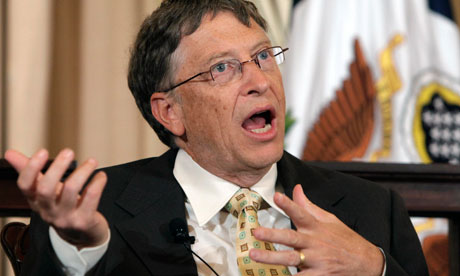
Bill Gates: founder of Microsoft, philanthropist, computer whizz – and now book reviewer. On Wednesday, in a review on his website, the billionaire gave the thumbs-up to Vaclav Smil's Prime Movers of Globalization: The History and Impact of Diesel Engines and Gas Turbines, praising how it "focuses in on a slice of 20th century technological innovation and shows the phenomenal impact it has had on international trade and travel", summing it up as full of "fascinating historical points and statistics", and calling it "an interesting read". "What most fascinated me was learning about the incredible impact these two innovations have had on so many aspects of our lives," he concluded.
The Microsoft founder is, it emerges (via the LA Times's Jacket Copy), a prolific book reviewer, tackling everything from Matt Ridley's The Rational Optimist ("Mr. Ridley spends 14 pages saying that everything will be just fine in Africa without our worrying about negative possibilities. This is unfortunate and misguided") to Peter Buffett's Life Is What You Make It ("We've known Peter for many years because of our friendship with Warren, and the whole Buffett family. It's a thoughtful and touching book, and we plan on reading it with our older children") and Steven Brill's Class Warfare: Inside the Fight to Fix America's Schools ("I hope this book is widely read because it shows just how difficult it is going to be to improve education, including creating a personnel system that invests in improving teacher effectiveness").
But is he any good? Over at Jacket Copy, Carolyn Kellogg writes that Gates has "much improved" since he first posted a book review in February 2010, of Steven Levitt's and Stephen Dubner's SuperFreakonomics, when he wrote: "I really liked Freakonomics and I think SuperFreakonomics is even better." "If one of my freshman writing students had turned that in, it wouldn't have gotten a B-minus," said Kellogg. These days, though, Gates "often uses a personal take, explaining why he's interested in this topic, and sometimes comes with a critical eye".
The titles he's chosen to review are exactly what I'd expect from Gates – serious, weighty non-fiction. I'd love to see his take on a couple of novels as well – if, that is, he ever has time to relax with a bit of fiction. That aside, Gates is certainly streets ahead of other "celebrity" book reviewers: last year the UK's TV Book Club saw actor Denis Lawson admit he "hardly read anything" to interviewer Gok Wan. Commenting at the time, Mark Lawson called Denis's confession "an honest but dangerous gambit on a literary panel show", but pointed out he was in good company: "discussing the book of the week, Gok confessed: 'I have to admit – I'm not really at the end yet.'"

